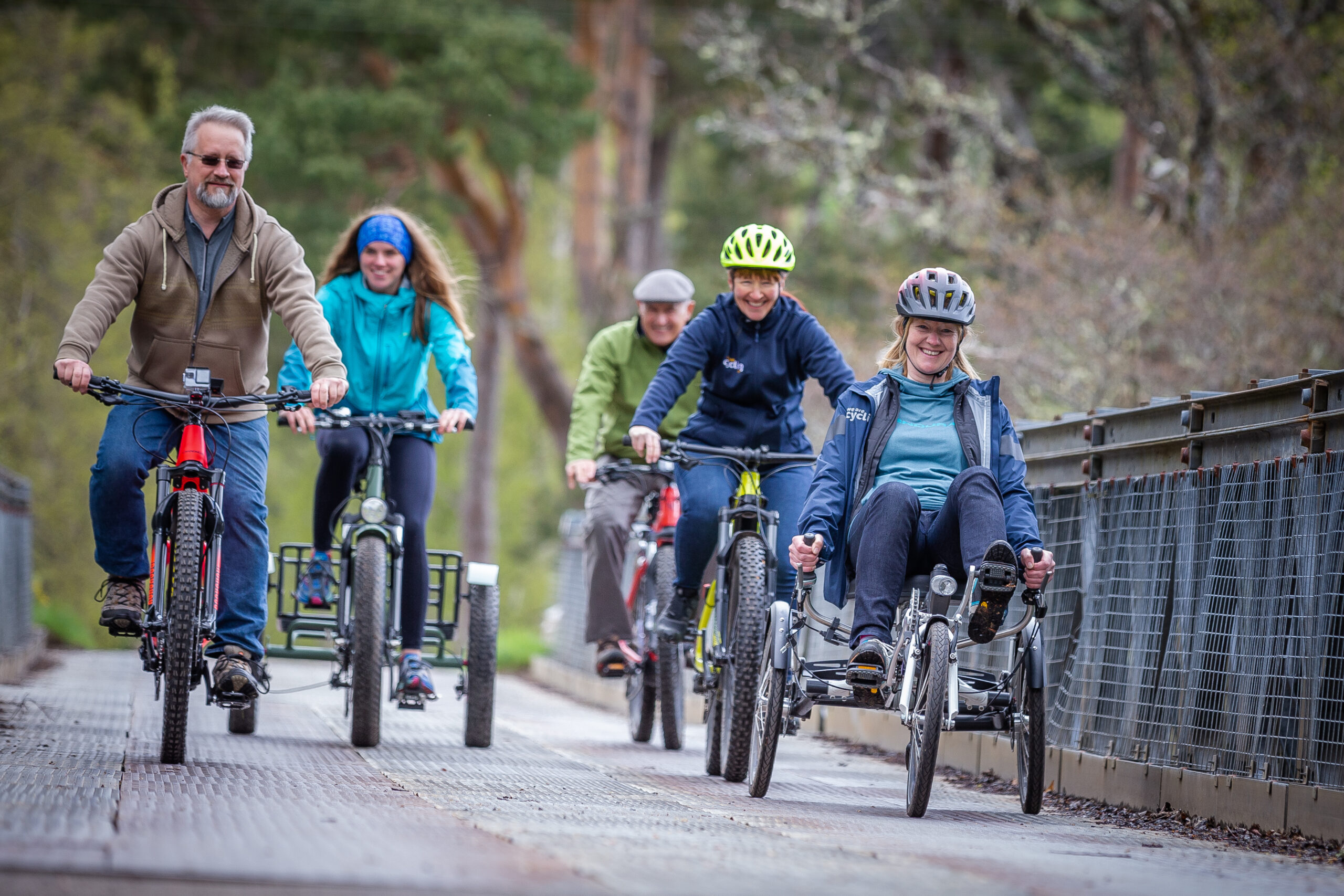Cycling helps tackle poverty – here’s how
Despite the recent falls in inflation, the cost-of-living crisis has not gone away and many families in Scotland are struggling with hard decisions on how to manage on fixed, limited incomes. Around 21% of Scotland’s population live in relative poverty, including many in working households, reducing opportunities and choices for individuals and communities.[1]
We know that cycling can help tackle inequalities; Cycling UK has delivered cycling projects in Scotland for over a decade, focusing support on those that are underserved or are in communities that traditionally have not seen cycling as a transport option for them, such as disabled people or those living with health conditions. Many of our participants have trusted us with their life stories and the positive difference that cycling has made to their lives - from saving money to reducing isolation and improving health, we know that cycling can be transformative.
Receiving a bike has helped Beth save a lot of money, as she started cycling for work, shopping, and other everyday journeys:
“I couldn't always afford to make extra journeys on public transport so would miss out on visits with friends especially that live far away, now I cycle there and back. I spend half of what I used to on travel expenses because I [can] cycle to places.”
Reducing transport costs, increasing health and wellbeing
Transport takes up 15 % [2]of average household incomes in Scotland, which is a significant burden for those on the lowest incomes. Cycling can be a low-cost solution for many of our short everyday journeys – to see friends, to shop and reach education or work – as over 50% of car journeys are less then 2km[3], which most people can cycle in a few minutes. Cycling UK’s projects support people to make the transition from car to cycle, providing direct support where we have our place-based programmes and funding local community organisations to provide access to bikes.
For those that need to maintain a car but can switch some car journeys to cycling, the savings can accumulate. For example, Geraldine*, one of our e-bike loan participants at the Golspie Bothy, made the leap to purchase an e-bike after she calculated that her journey to work would cost 11p by e-bike instead of £4.98 by car. An interest-free agreement from her local bike shop meant she was able to purchase her e-bike over a period that worked for her budget:
“The environmental issues we are facing is what made me look into an e-bike. It is going to be my mode of transport for work. The cost of an e-bike was a lot of money, so it had to be a big saving. Seeing how much I could save per week/day is what helped me make that decision, along with having a longer-term loan to see if I would use it”
E-cycles can also enable longer journeys, and consequently open up more distant opportunities, from work to education, that otherwise would be out of reach. Our Access Bikes and Rural Connections projects were able to help Calum, aged 21 and living in the hilly Scottish Borders, obtain an e-bike so he could travel between home and his two jobs, clocking over 55 miles a week.
We know that cycling isn’t viable for everyone, and travel choices are complex, gendered and affected by health, caring responsibilities, and location, but many more people can get around on two or three wheels than some think, if the right cycle and support to use it is provided.
Alex* hadn’t ridden a bike for more than a year, but now cycles weekly on an e-bike:
“Previously, I drove even for journeys within the village [0.5 – 2 miles], because I can rarely walk more than one or two hundred metres… [Now] I have been able to pick up my son from school and cycle home with him.”
Less obvious than directly saving money on transport, research by Cycling UK has shown that families with children that cycled together also saved money by using cycling as a leisure activity in itself, rather than engaging more expensive ‘days out’.
Making cycling accessible for everyone
Whilst some families can reduce their monthly outgoings by switching car journeys for trips by bike, we know that those that live on the lowest incomes do not have that choice. Both car and cycle ownership increase with affluence – 50% of households living on less than £10,000 a year do not own a car (and 70% do not have access to a bike), compared to 2% (only 27% do not have access to a bike) among households living on more than £50,000 a year[4]. This means that those on the lowest incomes are unable to switch from car to cycling as the majority of families don’t have access to one.
Some families on lower incomes are in ‘forced car ownership’, where the costs of a car are stressing the household income, but it is required for particular journeys (perhaps due to shift work, when no public transport is available) or specific household needs (disabled children that cannot easily use other transport methods).
For many in transport poverty (where you spend a disproportionate amount of your income on transport), without access to a bike, the only choices are between a long walk (perhaps at the end of a tiring work shift or with heavy shopping bags), an expensive public or private transport journey, or not travelling at all. For those living in mobility poverty (e.g., where there is no public transport, or it’s inaccessible), such as those in very rural areas, there isn’t even a choice – you simply can’t travel. This lack of public or sustainable transport options increases inequalities and prevents people, and communities, from thriving.
Cycling is Sam’s* only option for getting to work in Moray: “There aren't any buses available at the times I need to travel to work, so having my bike serviced is absolutely essential to me, especially as I am on a low wage.”
Cycling UK believes that everyone should be able to benefit from cycling – from the simple joy of travelling under your own steam to the tangible reduction in transport costs and improvements in health and wellbeing. Our projects focus on reducing inequalities – that means providing bikes where they are needed, ensuring recipients are confident and capable of using them and keeping people pedalling for as long as we can.
Providing access to bikes
Whilst the cost of a standard bike is significantly less than a car, it’s still an investment. The bike retail market is turbulent at the moment, with some stock reduced, but overall costs have increased due to inflation. You’re unlikely to find a good quality bike available for less than £350 and we know that for people financially struggling that this level of up-front purchase isn’t feasible, and those that are financially excluded are least able to obtain affordable or fair credit. There are low-cost options available at bike recycling centres, but these can be limited in size and suitability. Our Access Bikes scheme enables community organisations to purchase cycles for people that they know need support to obtain one that will suit their circumstances.
.. and keeping them on the road
Keeping a bike roadworthy is vital in enabling people to stay cycling. We established the Scotland Cycle Repair Scheme (SCRS) in 2020 as a Covid response measure, enabling people to get unused cycles back into use with £50 of free repairs (£100 for disabled people with a non-standard cycle) at over 300 bike repair organisations. Over the three years of its operation, SCRS enabled over 80,000 cycles to be repaired. We know from our evaluation that support to repair and maintain a cycle in a safe condition is vital for people that are financially struggling:
“My brake pads badly needed replacing but I kept putting off getting them fixed because I relied on my bike to get places and I was worried about both the cost of getting them fixed and the cost of getting public transport whilst my bike was being fixed. The scheme meant that I didn't have to worry about [that]. I saved money and I feel much safer cycling!”
We know that not everyone wants to own their own bike, so we’ve recently launched the Cycle Share Fund, supported by Transport Scotland, to enable organisations to provide cycles to their communities – for sharing, loan, by subscription or through a bike library. We’re looking forward to hearing how people can benefit from a bike, even when they don’t own it.
Cycling UK believes that cycling can be transformational – for individuals, communities and our planet – and a tool for social justice. As a cycling charity we can’t solve the fundamental inequalities that create poverty, but we know that we can reduce some of the impacts of that inequality by helping more people to cycle. It’s a privilege to share just some of the work we do and we’re proud to be supporting Challenge Poverty Week. If you would like more information, please get in touch.
[1] Poverty and Income Inequality in Scotland 2019-22 (data.gov.scot)
[2] Scottish Transport Statistics 2022 | Transport Scotland



Enter your email address to receive regular e-updates about our work. If at any time you want to stop receiving these, simply contact us. We’ll keep your details safe and won’t share them with any other organisations for their marketing purposes. For full details see our Privacy Policy.